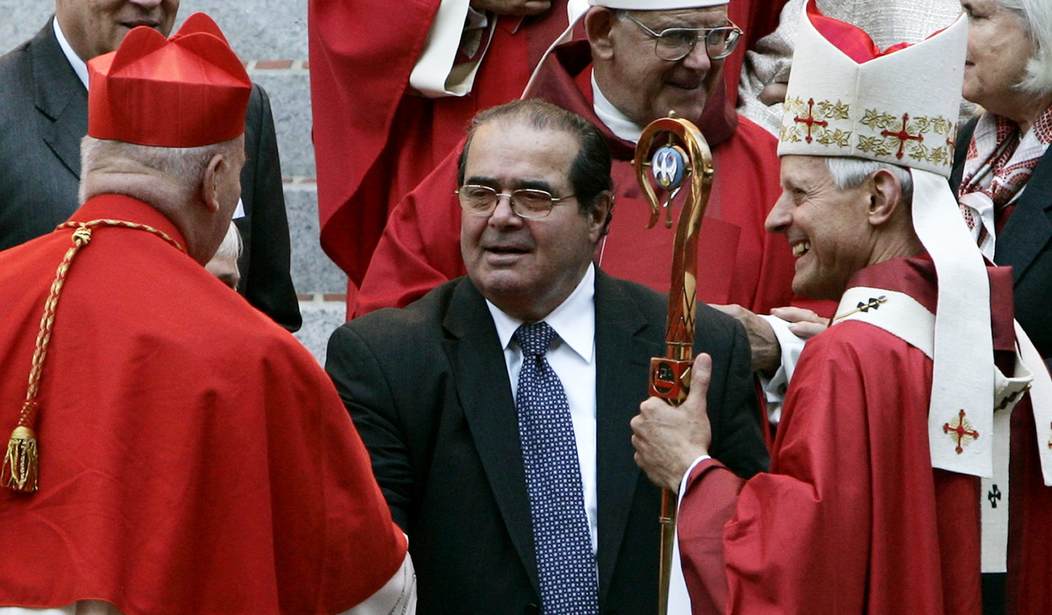Conservatives are mourning the death of Supreme Court Justice Antonin Scalia over the weekend at the age of 79. Beyond the obvious concern over who will succeed him in the twilight years of the Obama presidency, Scalia’s passing marks the end of the era of one of the court’s most impressive minds. But as important as his legal acumen was to the high court and to conservatism as a whole, the justice was also a man of deep Christian faith.
We’ve already seen how Scalia held up the value of religious freedom, and his faith was the bedrock of his life. He was a lifelong Catholic who attended Jesuit educational institutions, and he held to a traditionalist view of the faith. He attended St. Catherine of Siena Church in Great Falls, Virginia, “because it was one of the few Catholic parishes in the Washington, D.C., area that still offered a Latin mass.”
His Catholicism was a defining way of life, not just in his younger days, but in later years as well.
…as a justice he told students that as a young Catholic he endured meatless Fridays and fasting before Communion because the church had taught him and his peers “that we were different.” While other couples had small families, Scalia and his wife raised nine children. “Being a devout Catholic means you have children when God gives them to you,” he told his biographer Joan Biskupic.
Interestingly enough, the devout Catholic deviated from the church on a few issues, most notably the death penalty and what he saw as a lack of evangelistic fervor on the part of the church. Scalia took issue with Rome’s position on capital punishment—particularly as expressed by Pope Francis. He once wrote:
I do not find the death penalty immoral. I am happy to have reached that conclusion, because I like my job, and would rather not resign.
Nevertheless, he considered himself and his wife “just old-fashioned Catholics.” But how did this deep faith inform his decisions as Supreme Court justice? Naturally, he held to the conservative beliefs of Catholics and other Christians, particularly when it comes to issues like abortion.
Scalia did not think of himself as a jurist who applied the law strictly as a Catholic, but his faith was a double-edged sword. His brand of Christianity no doubt informed and cemented his convictions. As Paul Clement, George W. Bush’s solicitor general put it recently, while the justice was still alive:
“I think he thinks that his faith provides him clear answers,” Clement said, “and I think that’s sufficient unto him in most areas.”
Yet, according to Scalia, the only morality that mattered to the Supreme Court was that which resided in the Constitution. Writer David Gibson noted a few years ago that Scalia’s nearly clinical reverence for interpreting morality in light of the law raised an interesting question for Catholics—and maybe all Christians who practice law:
Scalia’s near-indifferentism to the morality of the law is striking to me as well, in that it sounds like he’d be championing abortion rights if he thought they were in the Constitution. (And I believe he has said he has no problem with states passing right to choose laws.) So does morality have a place in the law?
Justice Antonin Scalia was a man of deep, traditional faith who relied on his beliefs to serve as his guide throughout his long and distinguished life. In the end, we may best remember him for applying his religious convictions to his vocation in a way that should inspire all people of faith:
“A big part of his legacy will be how he navigated the relationship between one’s deeply held faith commitments and one’s role as a judge,” [law professor Richard] Garnett, of Notre Dame, says. “For him, the way to navigate that relationship, it was not to compromise one’s religious faith or water it down, it was to distinguish between the legal questions the judge has the power to answer and the religious commitments that a judge has the right to hold, just like all of us do.”










Join the conversation as a VIP Member